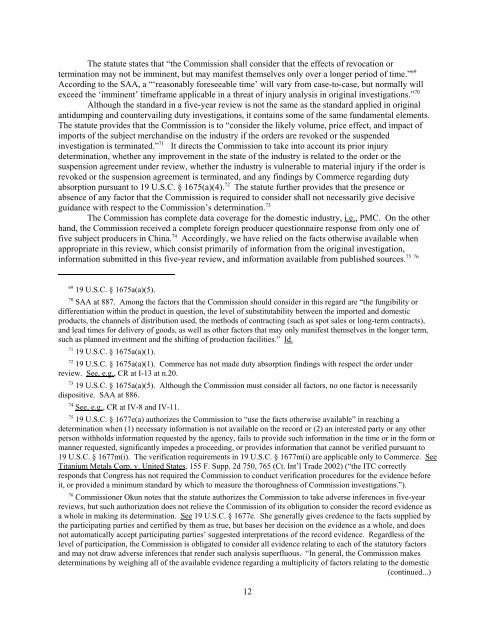Saccharin from China - USITC
Saccharin from China - USITC
Saccharin from China - USITC
You also want an ePaper? Increase the reach of your titles
YUMPU automatically turns print PDFs into web optimized ePapers that Google loves.
The statute states that “the Commission shall consider that the effects of revocation ortermination may not be imminent, but may manifest themselves only over a longer period of time.” 69According to the SAA, a “‘reasonably foreseeable time’ will vary <strong>from</strong> case-to-case, but normally willexceed the ‘imminent’ timeframe applicable in a threat of injury analysis in original investigations.” 70Although the standard in a five-year review is not the same as the standard applied in originalantidumping and countervailing duty investigations, it contains some of the same fundamental elements.The statute provides that the Commission is to “consider the likely volume, price effect, and impact ofimports of the subject merchandise on the industry if the orders are revoked or the suspendedinvestigation is terminated.” 71 It directs the Commission to take into account its prior injurydetermination, whether any improvement in the state of the industry is related to the order or thesuspension agreement under review, whether the industry is vulnerable to material injury if the order isrevoked or the suspension agreement is terminated, and any findings by Commerce regarding dutyabsorption pursuant to 19 U.S.C. § 1675(a)(4). 72 The statute further provides that the presence orabsence of any factor that the Commission is required to consider shall not necessarily give decisiveguidance with respect to the Commission’s determination. 73The Commission has complete data coverage for the domestic industry, i.e., PMC. On the otherhand, the Commission received a complete foreign producer questionnaire response <strong>from</strong> only one offive subject producers in <strong>China</strong>. 74 Accordingly, we have relied on the facts otherwise available whenappropriate in this review, which consist primarily of information <strong>from</strong> the original investigation,75 76information submitted in this five-year review, and information available <strong>from</strong> published sources.6919 U.S.C. § 1675a(a)(5).70SAA at 887. Among the factors that the Commission should consider in this regard are “the fungibility ordifferentiation within the product in question, the level of substitutability between the imported and domesticproducts, the channels of distribution used, the methods of contracting (such as spot sales or long-term contracts),and lead times for delivery of goods, as well as other factors that may only manifest themselves in the longer term,such as planned investment and the shifting of production facilities.” Id.7119 U.S.C. § 1675a(a)(1).7219 U.S.C. § 1675a(a)(1). Commerce has not made duty absorption findings with respect the order underreview. See, e.g., CR at I-13 at n.20.7319 U.S.C. § 1675a(a)(5). Although the Commission must consider all factors, no one factor is necessarilydispositive. SAA at 886.74See, e.g., CR at IV-8 and IV-11.7519 U.S.C. § 1677e(a) authorizes the Commission to “use the facts otherwise available” in reaching adetermination when (1) necessary information is not available on the record or (2) an interested party or any otherperson withholds information requested by the agency, fails to provide such information in the time or in the form ormanner requested, significantly impedes a proceeding, or provides information that cannot be verified pursuant to19 U.S.C. § 1677m(i). The verification requirements in 19 U.S.C. § 1677m(i) are applicable only to Commerce. SeeTitanium Metals Corp. v. United States, 155 F. Supp. 2d 750, 765 (Ct. Int’l Trade 2002) (“the ITC correctlyresponds that Congress has not required the Commission to conduct verification procedures for the evidence beforeit, or provided a minimum standard by which to measure the thoroughness of Commission investigations.”).76Commissioner Okun notes that the statute authorizes the Commission to take adverse inferences in five-yearreviews, but such authorization does not relieve the Commission of its obligation to consider the record evidence asa whole in making its determination. See 19 U.S.C. § 1677e. She generally gives credence to the facts supplied bythe participating parties and certified by them as true, but bases her decision on the evidence as a whole, and doesnot automatically accept participating parties’ suggested interpretations of the record evidence. Regardless of thelevel of participation, the Commission is obligated to consider all evidence relating to each of the statutory factorsand may not draw adverse inferences that render such analysis superfluous. “In general, the Commission makesdeterminations by weighing all of the available evidence regarding a multiplicity of factors relating to the domestic(continued...)12
















